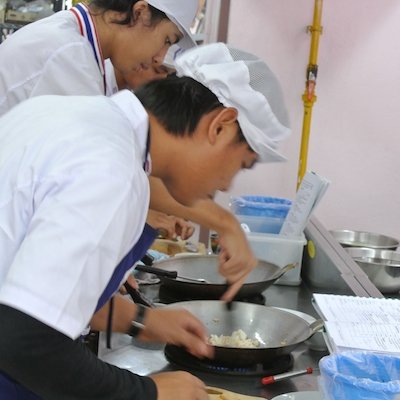As Italians who keep on praising the superiority of our cuisine, despite the gaffes of our vice-secretary to Culture who brutally tears it to shreds, we should learn from the example given by the Thai government. The visit to two cooking schools in Bangkok, especially to the first one, opened my eyes on a unique project which I’m about to describe. But before that I must make a premise. When talking with the local managers of the people we’ve met during this trip, on the occasion of Thaifex 2013, one of us happened to ask why a certain lady was holding an important position. This is one of those questions which, should you ask it in Italy, is because you suspect there’s something fishy about it. Here, instead, the answer was prompt and lapidary: “Because she’s good”.
The same goes for another lady with a non-specified age, around eighty, let’s say, who’s also good, very good, namely
Wandee Na-songkhla. In 1993, 20 years ago, that is, she opened a school of her own, the first to be acknowledged by the Ministry of Education, eight years after she had been called to teach in the one founded by princess
Maha Chakri Sirindhorn.
The objective was not to train generations of housekeepers – indeed, with all the street food available, one wonders if there are any – but to put Thai cuisine back on the right track. With a strong Chinese minority (Thai people are 50 million, while the total population is about 70 million) and a lively popularity of Thai food worldwide, during the Eighties far too many people began to act as interpreters of a tradition that wasn’t their own. As a consequence, together with public authorities Wandee decided to give a certificate to those who completed their studies and passed the exams, a diploma which was acknowledged by the Thai Ministry of Foreign Affairs and by many embassies in Bangkok. Today there are about 15 schools that can give this certificate, most of them in the capital. Moreover, the Ministry of Commerce and the Ministry of Labour are now involved too.
Over two decades, some 30 thousand students, equally divided between men and women, graduated from Mrs Wandee’s school. They were taught to preserve, strengthen and spread Thai cuisine. All this had an economic and touristic element, inside and outside the country. Of course, anyone could get up one morning and decide to cook Thai food, whether he’s from Thailand or not (as for myself, I’ve just had an excellent dinner in a restaurant called Bo.lan in which one of the chefs is Australian). After all, many improvise themselves as Italian chefs, a bit everywhere. This is however the reason why this programme exists: so as to create some serious and sound alternatives. The administration office, for instance, has just received a request for a Thai chef from a large hotel in Poland. Among those who have replied, 5 graduates were chosen and one of them will soon move to Warsaw. A restaurant with a chef who comes from Thailand is more credible. Same goes for a Russian chain of hotels, in this case the request was for two chefs.

recently presented her Culinary technical college, with a 3 year course, but there are shorter ones too. There’s also a course for journalists who intend to become culinary critics - it lasts 10 days. The founder said: “First of all, we teach the right flavour of the dishes that shape our history”. In other words, alphabet and grammar come first, poems and novels only later.
On top of this, the Ministry of Industry sponsors the Best Thai Restaurant award. The prize goes to those who excel with reference to the taste of the food, the general governance, the skill from the nutritional point of view, and, fourth point, good administration and business skills. The very revenue, which some forget, is the objective of a restaurant enterprise.
2. to be continued